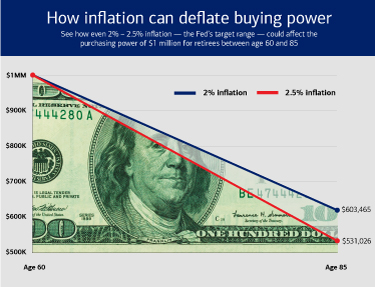1 U.S. Bureau of Labor Statistics, “Consumer Price Index — August 2023,” September 13, 2023
2 U.S. Bureau of Labor Statistics, “CPI for All Urban Consumers,“ September 29, 2023
3 Social Security Administration, “Social Security Announces 8.7% Benefit Increase for 2023,” October 13, 2022
4 NBC News, “Social Security COLA increase for 2024 could be higher than expected,” September 13, 2023
5 SHRM, “Workers Say Inflation is Bigger Retirement Obstacle This Year than Last,” August 15, 2023
6 Social Security Administration, “When to Start Receiving Retirement Benefits,” January 2023
7Employee Benefits Research Institute, February 2023
Important Disclosures
Opinions are as of 10/31/2023 and are subject to change.
This information should not be construed as investment advice and is subject to change. It is provided for informational purposes only and is not intended to be either a specific offer by Bank of America, Merrill or any affiliate to sell or provide, or a specific invitation for a consumer to apply for, any particular retail financial product or service that may be available.
The Chief Investment Office (CIO) provides thought leadership on wealth management, investment strategy and global markets; portfolio management solutions; due diligence; and solutions oversight and data analytics. CIO viewpoints are developed for Bank of America Private Bank, a division of Bank of America, N.A., (“Bank of America”) and Merrill Lynch, Pierce, Fenner & Smith Incorporated (“MLPF&S” or “Merrill”), a registered broker-dealer, registered investment adviser and a wholly owned subsidiary of Bank of America Corporation (“BofA Corp.”).
Investments have varying degrees of risk. Some of the risks involved with equity securities include the possibility that the value of the stocks may fluctuate in response to events specific to the companies or markets, as well as economic, political or social events in the U.S. or abroad. Bonds are subject to interest rate, inflation and credit risks. Treasury bills are less volatile than longer-term fixed income securities and are guaranteed as to timely payment of principal and interest by the U.S. government. Investments in foreign securities (including ADRs) involve special risks, including foreign currency risk and the possibility of substantial volatility due to adverse political, economic or other developments. These risks are magnified for investments made in emerging markets. Investments in a certain industry or sector may pose additional risk due to lack of diversification and sector concentration.
“Bank of America” is a marketing name for the Retirement Services business of Bank of America Corporation ("BofA Corp.").
An annuity is a contractual agreement where a client makes payments to an insurance company, which, in turn, agrees to pay out an income stream or a lump sum amount at a later date. Annuities typically offer (1) tax-deferred treatment of earnings; (2) a death benefit; and (3) annuity payout options that can provide guaranteed income for life. The fees and charges associated with annuities may include, but are not limited to mortality and expense risk charges, administrative and distribution fees, as well as charges for the underlying investment options and optional benefits. Early withdrawals may be subject to surrender charges, and taxed as ordinary income, and in addition, if taken prior to age 59½ an additional 10% federal tax may apply.
All annuity contract and rider guarantees, including optional benefits and any fixed or index-linked investment option crediting rates or annuity payout rates are backed by the claims-paying ability of the issuing insurance company. They are not backed by Merrill or its affiliates, nor does Merrill or its affiliates make any representations or guarantees regarding the claims-paying ability of the issuing insurance company.
Asset allocation, diversification and rebalancing do not ensure a profit or protect against loss in declining markets.
Alternative investments are speculative and involve a high degree of risk.
Alternative investments are intended for qualified investors only. Alternative Investments such as derivatives, hedge funds, private equity funds, and funds of funds can result in higher return potential but also higher loss potential. Changes in economic conditions or other circumstances may adversely affect your investments. Before you invest in alternative investments, you should consider your overall financial situation, how much money you have to invest, your need for liquidity, and your tolerance for risk.





